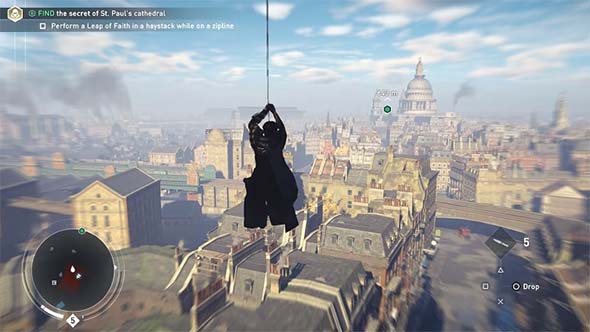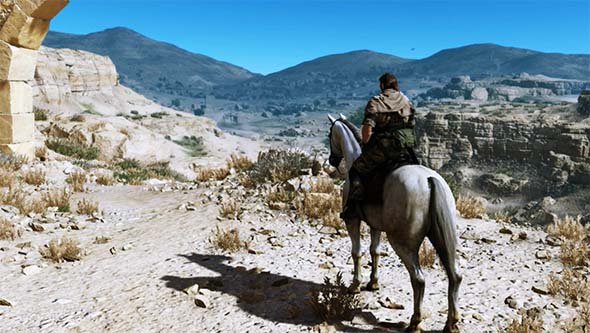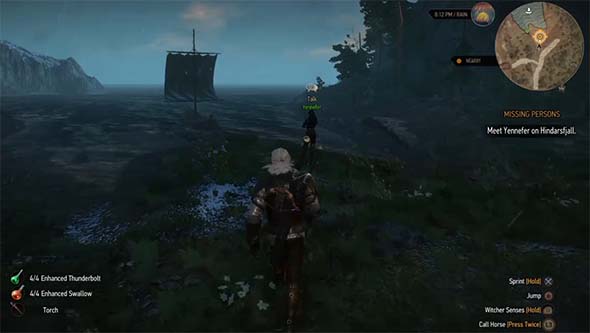Last time, I discussed what I perceive as a problem in the way that most open world games (specifically, sandbox games) design their maps and use the space that the maps offer - or fail to use that space, to be more specific. So many open world maps end up feeling less like actually playing the game, and more like a convoluted mission-select and collectible checklist screens. This problem is especially bad in the Ubisoft model of design, and is also a problem (to a lesser extent) in Bethesda's open worlds. Due to the popularity of these developers' franchises, many other developers have been cloning these styles of games to one extent or the other, to the point at which Ubisoft's open world model seems to be the go-to template for any developer trying to make an open world game. These games aren't necessarily bad. They just aren't very good at making the space of their maps feel meaningful in its own right.

Many open world games have large, expansive maps that mostly feel empty and pointless,
as the player rushes through them simply to get to the next map marker or checklist item.
But now that I've established what I see as a problem, I want to focus on positive feedback. In this discussion, I'm going to look at a handful of games that should serve as inspirations for would-be open world developers. Ironically, some of these games aren't even open world games, but they still pose valuable lessons for how games that are open world could better use their game spaces. That isn't to say that the games discussed here are perfect. In fact, many of them have their own major flaws. But each of them has some element of design that utilizes the actual game map as a component of active play, rather than just a space in which game sequences exist. First, let's take a look at a game that was re-made recently, and use it as a "before and after" case study of map design... [More]
75d0658b-0278-43f3-a9e5-d3df3d01939d|4|4.3
Tags:open world, map, traversal, travel, cartography, geography, narrative, ludonarrative, ludonarrative dissonance, quest, vehicle, driving, racing, exploration, wasteland, survival, resources, Ubisoft, Bethesda, Resident Evil, Metal Gear Solid V: the Phantom Pain, Assassin's Creed, The Elder Scrolls, Skyrim, The Witcher 3, Grand Theft Auto, Grand Theft Auto V, Grand Theft Auto: San Andreas, Shadow of Mordor, Fallout, Fallout: New Vegas, Wasteland 2, Mad Max, Miasmata, Assassin's Creed IV: Black Flag, Burnout: Paradise, Shadow of the Colossus, Dark Souls
Playing games like Skyrim, Grand Theft Auto, Assassin's Creed: Black Flag, The Witcher 3, Mad Max, Metal Gear Solid V, and other open-world games has made me increasingly weary of open-world gaming. Narrative-based, open world games like these suffer from a problem that I have started calling "open world limbo" (or "open world purgatory"). This is a sort of paradoxical offshoot of the concept of ludonarrative dissonance. The game's open world "sandbox" design seems to directly conflict with the narrative that the game is trying to tell. It specifically refers to the conflict between the story and the game's open world, rather than a conflict between the game's story and any particular game system(s). Generally, this manifests as the game designers setting the stakes so high that the player should feel pressured to progress the narrative, but the game's open world design never follows through with any real consequences for not progressing.

More and more big-budget games are going open world. is this a good thing?
This leads to problems in which the player can spend hours, weeks, or months doing tangential, or completely unrelated, tasks and pushing the game's story objectives down to the bottom of their priority list. For people who just like to play the game, this may not be much of a problem. They get a massive sandbox in which to do anything they want. That is actually one of the back-of-the-box selling point for most of these games.
But as one of those "games as art" kind of snobs, I also really like to have an engaging narrative that flows seamlessly with the gameplay. So if a game offers a narrative of any kind, you bet I'm going to judge the game based (at least in part) by how well that narrative works and how fully it is integrated into the core gameplay experience. And when a game tries to convince the player that they are destined to save the world from impending doom (as is often the case with big-budget, open world games), then I get really peeved when I find myself able to completely eschew that destiny in favor of picking flowers and peddling salvaged bandit armor for the next 100 hours.
A world in stasis
The source of most of the "limbo" comes down to the fact that these games' worlds (despite being big and detailed) often feel static and devoid of life. They don't change on their own. No one seems to have any sense of agency, and nothing ever happens unless the player is there to make it happen. Quest-givers sit around outside their house forever waiting for the player to come along and help them kill the wolves that are attacking their livestock, or find their missing heirloom, or deliver their special package to someone in the next town over, or whatever else they want done. The situation never resolves itself, the quest-giver never gets tired of waiting for you and hires another adventurer, those wolves never manage to eat all the remaining livestock, the heirloom never shows up in lost-and-found, and the statute of limitations on that package never expires. Emergencies can always wait [indefinitely] for the player to resolve them.

Quest-givers will wait forever for the player character to show up and solve their problems.
But worst of all is that the big, bad villain (if there is one) just doesn't feel very threatening or intimidating if he (or she, or it) isn't actually doing anything to actively antagonize the player or the world... [More]
ced5d1e2-3408-4ea8-8245-ca32f7affbe1|4|4.8
Tags:open world, limbo, option paralysis, narrative, ludonarrative, ludonarrative dissonance, consequences, punctuated equilibrium, quest, The Elder Scrolls, Oblivion, Skyrim, The Witcher 3, Grand Theft Auto, Final Fantasy, Mass Effect, The Legend of Zelda, Majora's Mask, Shadow of Mordor, Fallout, Sid Meier's Civilization, Cities: Skylines
|

| 12 | | | | | | | 60 | | 11 | | | | | | | 55 | | 10 | | | | | | | 50 | | 09 | | | | | | | 45 | | 08 | | | | | | | 40 | | 07 | | | | | | | 35 | | 06 | | | | | | | 30 | | 05 | | | | | | | 25 | | 04 | | | | | | | 20 | | 03 | | | | | | | 15 | | 02 | | | | | | | 10 | | 01 | | | | | | | 05 |
|